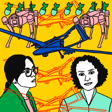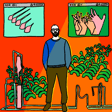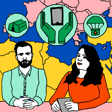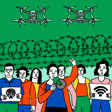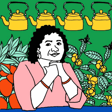Become a Creator today!Start creating today - Share your story with the world!
Start for free
00:00:00
00:00:01

1.3. Challenges of researching in Yemen with Hafez Al-Bukari
In episode 3 of Instant Coffee, Rasha Obaid Ba Sabih (@Rasha7Rasha) talks to Hafez Al-Bukari of the Yemen Polling Centre (@yemenpolling)about the challenges of researching in Yemen. The Yemen Polling Centre is an independent research centre which aims to impact local and international policymaking with the ultimate goal of improving the living conditions of the Yemeni people.
Transcript
The Hostile Environment for Research in Yemen
00:00:00
Speaker
They always are suspicious of fieldwork. They don't tolerate any scientific research. There is like a hostile environment toward research, especially in the political and in social matters.
Introduction to Instant Coffee & Hosts
00:00:19
Speaker
This is Instant Coffee, a new podcast brought to you by the LSE Middle East Centre and produced by me, Nadine Almanaspi and me, Yuval Sleiman Haydar.
00:00:31
Speaker
On this episode, Rasha Abed Pasabiya speaks to Hafiz Al-Bukhari about the challenges of doing research in Yemen today. Rasha is an artist and visiting fellow at the LSE Center for Women, Peace and Security. She has worked with the Peace Track Initiative since 2017, where she is managing their cultural, economic and environmental projects.
Challenges Faced by Yemen Polling Center
00:00:51
Speaker
Hafez is president of the Yemen Polling Center, an independent research center which aims to impact local and international policymaking with the ultimate goal of improving the living conditions of the Yemeni people. Over to you, Rasha. Hi, Hafez. Very nice to speak to you today. Hi, Rasha. It's good to talk to you.
00:01:11
Speaker
So I would like to ask you a few questions to start with about Yemen Polling Center. So the center has been around since 2004 and you have been collecting data from all over Yemen in different situations that Yemen has been through. Can you tell me more about the challenges you have been facing, especially in the recent
00:01:35
Speaker
years with the conflict to collect data. Yeah, sure. So as YBC established in 2004, we were facing some challenges before from the regime and the government at that time because they were thinking it was like the first research center that do public opinion research in Yemen.
00:01:58
Speaker
We were trying to face or accommodate the challenges and overcome these challenges and then the uprising happened in 2011. So we were having a very good environment for research.
00:02:16
Speaker
until 2014 when the Houthis took over Sana'a and then new challenges just happened with political unrest and with the Houthis controlling Yemen and especially the capital Sana
Impact of Political Unrest on Research
00:02:35
Speaker
'a.
00:02:35
Speaker
So from then we have been facing a lot of challenging and north and south, especially in the areas that are controlled by Houthis, because they always are suspicious of field work.
00:02:55
Speaker
They don't tolerate any scientific research. There is like a hostile environment toward research, especially in the political and in social matters. This was, I mean, happened for us as the YBC headquarters
00:03:19
Speaker
was shut down in Sana'a. We were not able to operate from Sana'a, so we moved to Thais and Aden, but we still work all over Yemen. Except Sa'ada, we are not able to do field work there.
Polling Methodologies in Yemen
00:03:35
Speaker
Okay, so to give the audience a bit of a background about your work, what is the polling methodology that you use? We know like in comparison to other countries, there's more likely to have maybe phone call polling, internet polling, but in Yemen with little reach of internet all over the country, what is, what methodologies do you use?
00:04:01
Speaker
This is an important point. In Yemen, we usually have been doing face-to-face interviews. We are collecting data in quantitative and qualitative ways, but we were depending mainly on face-to-face interviews method.
00:04:20
Speaker
Recently we tried to develop other methods like the using other systems like what they call CAUTI systems using the phone numbers, especially that
COVID-19's Influence on Data Collection
00:04:36
Speaker
we have
00:04:36
Speaker
developed a lot of databases on governance levels for the respondents and we have started to do phone interviews with respondents on different matters but a lot of challenges also happened in this regard despite that we were forced to do that with the
00:05:03
Speaker
new developments and the COVID and a lot of pandemics are striking Yemen these days. So we are trying also to do some fieldwork using phone calls. Can you elaborate more about the challenges you face now with COVID-19?
00:05:21
Speaker
The challenges, first, I mean, we were having these challenges, I mean, since 2014, the blockage for, I mean, the root blocks and the movement between governorates. It's hard now to move from like from Thais to Hodeida, from Hodeida to Aiden, from Aiden to Sanaa. So this one of the challenges that we have been facing
00:05:51
Speaker
In addition to that, there is like the security situation and sometimes these checkpoints and the militias tries to track the fieldwork teams. So these challenges were before COVID-19.
00:06:14
Speaker
But COVID-19,
Security Concerns in Data Collection
00:06:15
Speaker
I mean, when the information started to flow that there are infections in the country, we stopped doing training in the headquarters. We are now doing remote training. We stopped sending fieldwork teams
00:06:36
Speaker
for more than two persons to the field. We stopped doing interactions with the respondents. So these challenges happened and now we are trying to collect information on the respondents and build contact with them and then do the interviews by phones. I see.
00:06:58
Speaker
And do you feel that this security situation affected the participation rate? Do people sometimes, they don't want to participate? Before the security situation deteriorated in Yemen, we were having almost 85% response rate. After the deterioration of the security situation,
00:07:26
Speaker
went down up to 65 to 60 percent response rate for face-to-face interviews.
Focus on Gender and Women's Rights
00:07:34
Speaker
But for the phone calls interviews, it's just go down to 20 percent response rate because also people are suspicious of the phone calls, they think of censorship or monitoring for the phone calls.
00:07:49
Speaker
they don't trust to or they don't feel comfortable to respond and participate in the research over the phone.
00:08:00
Speaker
Okay. I saw that you have researched, done a lot of research done on gender and women's rights also at peace builders, women in security situation in some areas like Bala. I see also on your Twitter, you speak a lot about women's rights. He did support women since 2011, since the uprising.
00:08:20
Speaker
We try, I mean, to have gender aspect for and in most of our research and we want to highlight some issues regarding women, regarding their safety, regarding their movement, the regarding the violations that
00:08:36
Speaker
they could interfere regarding even the challenges that they face in the work or in their areas if they want to like to report a crime and if they want to issue like a civil documents like an ID or a driving license and not all families that they have their main prisons or they are there as you know that we have a lot of
00:09:04
Speaker
Yemeni immigrants outside Yemen, especially in the Gulf. So sometimes the women take responsibility of the whole family regarding different issues. When you conduct in-person door-to-door polling, how do you ensure that women in that situation are not being influenced or are more comfortable to speak? How do you reach them in such a situation?
00:09:32
Speaker
We understand from the beginning that Yemen is like conservative society, so we have built our field work teams with making sure that 50% of our field work teams are female interviewers, or more than that. So in our methodology, we have
00:09:52
Speaker
women interview women so when they reach out the the household they try to first to convince the like the head of the household that this interview should be I mean just woman to woman
00:10:09
Speaker
and it will not talk about their own issues as family and it's just to make the interview I mean smooth and try to convince them and as you know as conservative society also as
00:10:26
Speaker
Yemeni society always, I mean, the head of the house feels shy to be reluctant or saying, oh, we need to interfere.
Challenges in Rural Fieldwork
00:10:36
Speaker
Despite that, we have some cases that the head of the households sometimes or the elder son wants to be part of the interview or to see what's going on on what the interview is about.
00:10:51
Speaker
But we try to minimize that by having only women interview women. I see. And you mentioned the challenges also in speaking to women that has to do also with family members maybe interfering. Maybe could you also speak to us about what other challenges polysters might face that face in Yemen when they go door to door to collect data?
00:11:19
Speaker
First, I mean, the team have, first is the geographies that always challenge for us as a research institution because Yemen, as you know, is a mostly rural area, I mean, country. 70% of the population live in rural areas and the transportation to the rural areas is
00:11:45
Speaker
It's very, I mean, hard and you have to prepare yourself, I mean, sometimes to spend eight hours just to reach a specific area that was selected as sample and remote area and the countryside.
00:12:05
Speaker
This is the first challenge. The other challenge is the access. I mean, especially in the access from security perspective. I mean, as you want to knock the door and start to talk to the household members or the one that just respond to your knock and say, though, I am trying to do
00:12:32
Speaker
research and I have to I mean to go through our methodology of selection and to select someone like randomly by system way and you need to do a lot of efforts to explain to the family members that
00:12:54
Speaker
the person that was selected is not on purpose and we just make this for the quality of the research. So this is always challenging for us in the field. Recently we have the security situation challenge and the militias are spread all over the country and sometimes you just go to the field and someone from the
00:13:22
Speaker
the household that you are targeting as random sample, report to the militia saying there is someone or there is a team in the area. They are trying to collect data on different issues. So the militia come to the team and try to
Adapting to Security Challenges
00:13:42
Speaker
arrest them. And this has happened several times in the northern areas and in the southern areas as well. This must be really challenging.
00:13:51
Speaker
I would also think like, I would think of who would come and ask me like, for example, as a Southerner, would they also, is it easier to have, are they open to people coming asking from different areas or do you hire people from the same areas?
00:14:08
Speaker
This is a good question. I mean, because we always face this, I mean, before and but recently it became more challenging. So we don't send, I mean, people from government to different governments. So we always send, I mean, field work teams
00:14:28
Speaker
from the same government to do the fieldwork in the same government. So this is help regarding the response and regarding the access because the checkpoints always asking where are you from? Where do you want to go? What do you do? So this is always helpful to assign fieldwork teams from the same government to do fieldwork in the same government.
Consumption of YPC Data
00:14:51
Speaker
So who is your primary consumers of the data? So you have data as in graphs and charts, you have studies, you have also policy papers. Who is your main consumer of your polling?
00:15:09
Speaker
Do you feel that it does influence policymakers, internationals, and how much does it also influence the locals in Yemen? Does it have an impact on the Yemeni's perception when they see the results?
00:15:26
Speaker
As YPC, we work in two different ways. We have like an advocacy department that we prepare proposals on issues that we think that they are important to Yemen, especially in policy perspective.
00:15:46
Speaker
And then we get grants and we issue papers and also policy reports and research reports. The other side of the work that we have some clients and they reach us to do research for their own programs like government, embassies, international organizations, UN agencies.
00:16:16
Speaker
And we do public open air research like surveys like we work with with Gallup and other institutions. So we we work on and with these two wings with YPC regarding
00:16:31
Speaker
who is more interested in our research. The international community, of course, and the organizations, I mean, also the embassies, research institutions that are interested in Yemen, academics, researchers, and journalists. Unfortunately, we have been trying, I mean,
00:16:58
Speaker
push our national governments, local authorities to make benefit from our research.
Yemen's Future: Unity or Division?
00:17:11
Speaker
They honestly very seldom that we get feedback from them and we feel that they are
00:17:17
Speaker
they are interested in the research because I think that the awareness among them and they don't believe that this is important for their policies and they have this like the notion of they know everything and they know how to handle things. So to Rebab, I would like to ask you if there is any poll that you wish you would do if you had maybe more resources if the security situation helped?
00:17:47
Speaker
or maybe also the norms and the traditions in Yemen, what poll would you have, would you do? I would like, I mean, to do, I mean, survey these days, but I mean, with also bitter environment on how people they think they
00:18:06
Speaker
Yemen should be in five years from now. If they want one country, if they want division for the country, out of the influence of the elite.
Closing Remarks & Podcast Promotion
00:18:24
Speaker
So we want to ask people on their perspective what do they think their country should be five years from now.
00:18:34
Speaker
No, that's actually, that's a question that we all want to know and I wish we were able to and I think every group thinks that their group all want what they think they want, you know, like some group think it's just their group want one Yemen and the other ones think everybody wants two Yemen or federal system. Thank you very much, Hafat, for coming here and speaking to us today. Thank you so much. Thank you, Rasha. Thank you, everyone.
00:19:05
Speaker
Thank you Rasha and Hafiz for taking the time to speak to us and thank you for listening to Instant Coffee, your quick fix of everything Middle East. Join us every Friday for a new episode of Instant Coffee where we interview artists, activists, writers, journalists and more from the region. To find out more about the Peace Track Initiative and the Yemen Polling Centre, follow the links in the podcast description.
00:19:29
Speaker
Also make sure to subscribe to our podcast to stay updated on our latest episodes. Don't forget to follow us on Twitter, Facebook and Instagram. Until next time!

